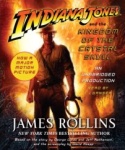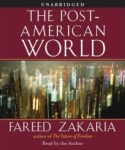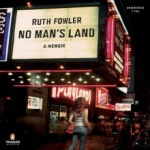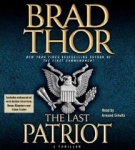Another
Column at MyShelf.Com
|
|||||||||||||||||||||||
| Audio Buzz, Past |
|||||||||||||||||||||||
| JULY 2008 AUDIO BOOK REVIEWS
AND HONORING NARRATOR EXTRAORDINAIRE FRANK MULLER
JONATHAN LOWE: How did all this start for you? Were you on stage, and afterward people came up to you, using words like "mellifluous" to describe your voice? FRANK MULLER: As a matter of fact, I was on stage, but the way it happened was that Henry Trentman, the founder of Recorded Books, posted a notice at the theater - Arena Stage in Washington, DC - hoping to find actors interested in his idea to start the company. For me it was a way to earn a few extra bucks, and for Henry it was the first audio book produced by his new company. This was in 1979, when very few people were involved in audio books.
LOWE: How did all this start for you? Were you on stage, and afterward people came up to you, using words like "mellifluous" to describe your voice? MULLER: As a matter of fact, I was on stage, but the way it happened was that Henry Trentman, the founder of Recorded Books, posted a notice at the theater - Arena Stage in Washington, DC - hoping to find actors interested in his idea to start the company. For me it was a way to earn a few extra bucks, and for Henry it was the first audio book produced by his new company. This was in 1979, when very few people were involved in audio books.
LOWE: What was your first title there? MULLER: The Sea Wolf by Jack London. We also did London's Call of the Wild, and some short stories, then some Dickens and others. Since then I've had great fun doing everything from John Le Carre to Anne Rice to Stephen King to John Grisham. I love moving back and forth between classics and modern fiction. There's a real benefit to that.
LOWE: How do you mean? MULLER: There might seem to be little to be gained by one genre from the other, or by a classic from a contemporary, but I feel that the batteries get recharged. The energy and topicality of a modern book can inform the approach to a classic, and the depth and richness of a classic can help me bring a more textured approach to a new work.
LOWE: A couple of my personal favorites of yours are The Green Mile and Apt Pupil by Stephen King. What do you think of Steven's turning more mainstream and literary? Of course he can write anything. He has such a wit underneath it all, too. MULLER: He has tremendous wit and humor. It's usually very sly, sometimes overtly mischievous, but always there. That's always part of his appeal, but he has written many quite beautiful and more "serious" stories, too.
LOWE: One of my favorites is "The Last Rung on the Ladder," not horror at all. MULLER: Check out a story called "The Reach," and don't forget "The Shawshank Redemption." And yes, The Green Mile will always be one of my favorite recordings as well. A special experience.
LOWE: I imagine you have to study a book to get a feel on how to handle the characters, regardless of genre. MULLER: One of the advantages inherent in working on a book rather than a play or a screenplay is that you have the entire book to draw from in preparation. Much of the work involved in developing a characterization in a shorter play or on film is detective work. Why does he say this, and why did he do that? That's part of the work in preparing to record an audiobook, of course, since you're responsible for all the characters. But the book will have much more detail included in exposition or internal monologues, or outright reading of a character's thoughts. Why he or she feels this way and is thinking those thoughts. By the time I'm finished with a careful work-through of a book, having taken vocabulary and character notes, and finished with whatever research is necessary, I'm usually pretty well ready to get to the mike.
LOWE: Do you prefer books with a lot of dialogue? Is the challenge of that more fun, while perhaps being more difficult? Or is anything difficult for you? MULLER: Oh my yes, it's all difficult! Is it fun? It sure is. I get to play all the characters, and I get to frame them in the narrative text. As involved and demanding as the narrative text can get, and even though it may sometimes be operating on several levels, when characters actually speak, the complexity expands exponentially. Playing one character is daunting enough, and that is usually all that is asked of an actor, but in a single voice recording you play them all. All the motivations, desires, hopes, and conflicts one character may experience interact constantly with those of the other characters. The development and consistent realization of all those characterizations is quite a challenge. But that's also where the fun lies. Your main bad guy in your book "Postal," for example, was terrific fun to play because he seemed so completely normal, but had this tremendous maelstrom of diabolical malignity just under the surface. Absolutely terrifying, and a blast to find and play the subtlety, and then the evil as it emerges. Makes for powerful stuff.
LOWE: Are there ever days when you're tongue-tied, and just want to sit in the jacuzzi? Please lie and say yes. MULLER: Yes. No, really. A recording is forever, and the narrator needs to be functioning at 100% in order to deliver the goods I was just talking about. And usually for many hours straight. It is exhausting work both mentally and physically, and if you don't pace yourself, you'll burn out.
LOWE: You have your own studio, called Wavedancer. How did that come about, and what does your schedule look like? MULLER: It had more to do with practicality. I wanted to be accessible as a narrator to audio publishers on both coasts, and the economics of this business do not allow for flying people in or out and putting up in hotels for days at a time to do a book. Because of my background I was capable of producing myself here in L.A., but that meant booking studio time, which got very expensive. I booked 500 hours in 1994, and decided to build my own home studio in 1995. It has worked well.
LOWE: What do you do by way of hobbies and other interests? MULLER: Kids. Hiking with my dogs. Horses, since my wife is a major horsewoman. Sailing, skiing.
LOWE: If you drive, do you listen to audio books, or is it Brandenberg Concertos vs. Van Halen? MULLER: On road trips, we stock up on audios. But I have wide musical tastes, so yes to both things you mention might be in the CD changer at any time.
LOWE: What do you foresee as the future of audio books? MULLER: Cassettes have a short future, and are already going away. CDs may survive longer. Sometime soon, possibly by 2010, a digital player format capable of not only downloading but receiving broadcast, will take hold with enough flexibility to make other mediums obsolete. But then, what the hell do I know? We thought we'd be sending HAL and Keir Dullea to Jupiter after that monolith by now.
LOWE: Any final thoughts for those waiting for us to leave so they can nab a table? MULLER: Just that the great thing for audio book listeners is that the quality of work in the industry will continue to improve as the industry and its audience grows. To those who are new to audio books, I envy you. You are about to discover something which can add a great deal to the quality of your life. Be picky, get recommendations, and read the good books first. You may not have time for all of them.
| |||||||||||||||||||||||
© MyShelf.Com. All Rights Reserved.




